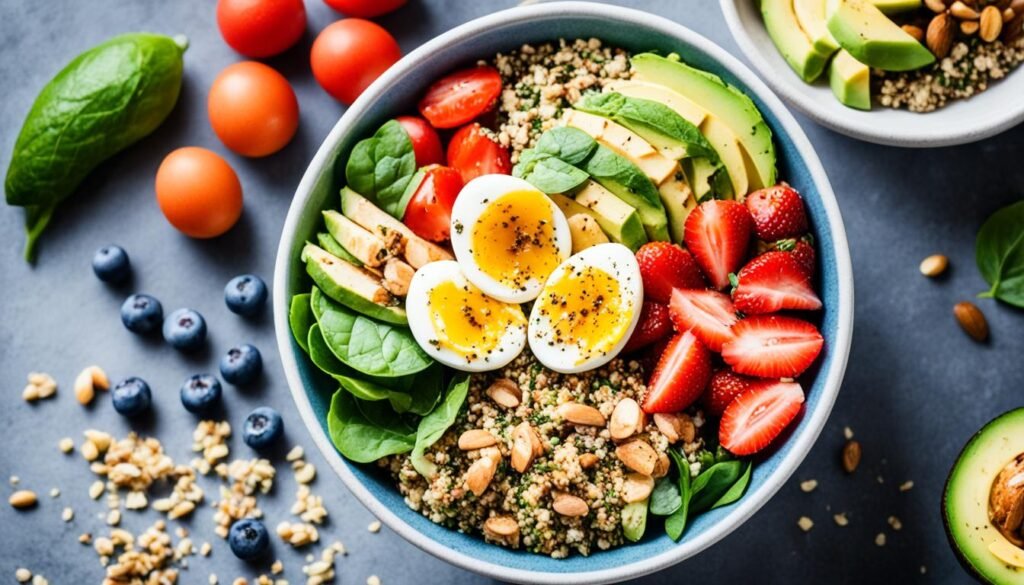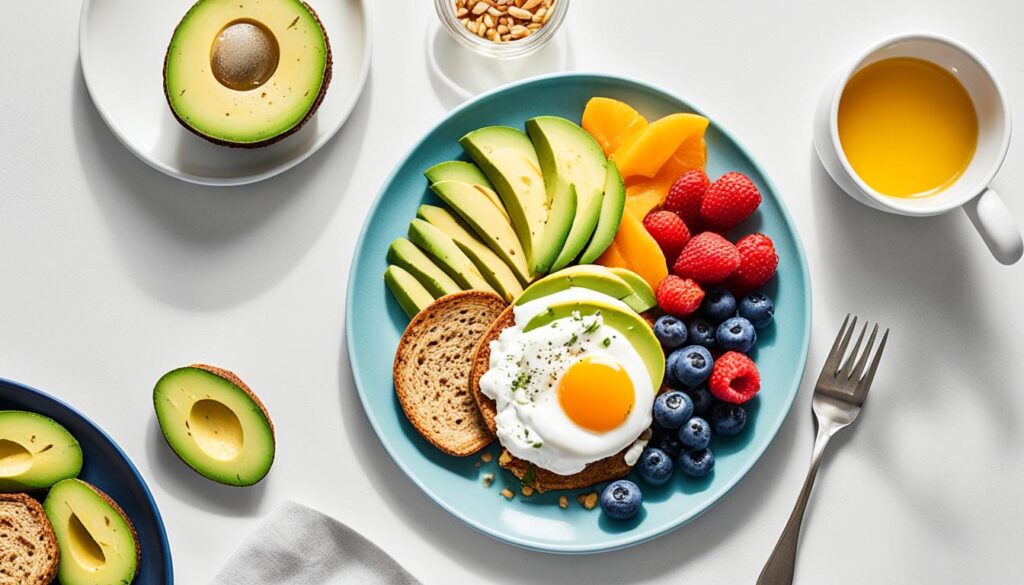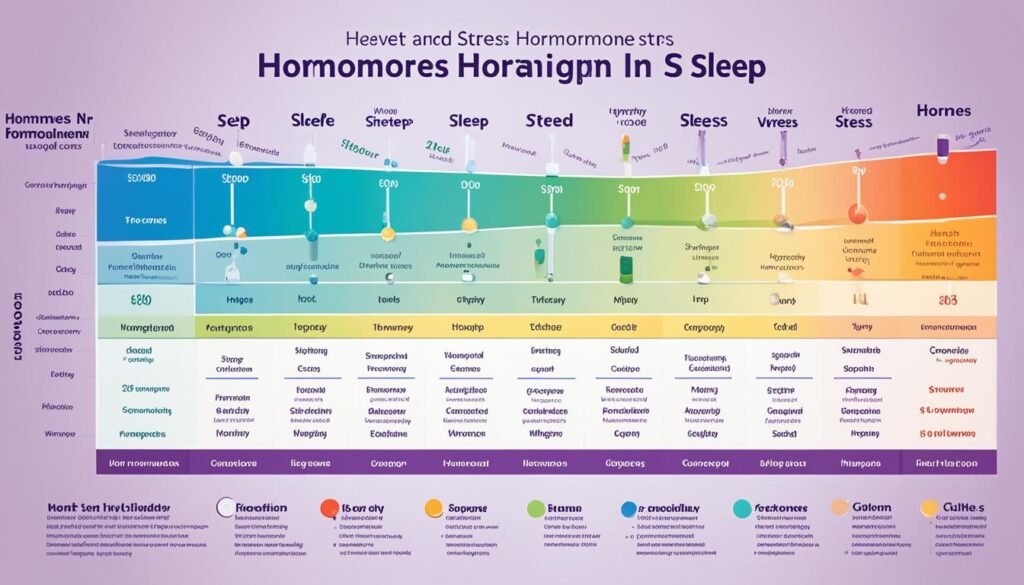How to Lose Weight Fast and Safely : Losing weight is a common goal for many individuals, but it’s important to approach it in a way that is both fast and safe. In this article, we will discuss effective strategies for losing weight quickly while prioritizing your overall health and well-being.
Key Takeaways : How to Lose Weight Fast and Safely
- For sustainable weight loss, aim for a gradual reduction of 1-2 pounds per week.
- Avoid fad diets and products that promise quick results as they can be harmful to your health.
- Focus on making long-term lifestyle changes that involve healthy eating and regular physical activity.
- Set specific, measurable, achievable, relevant, and time-sensitive goals to stay on track.
- Find your own motivation and don’t get discouraged by setbacks.
The Role of Nutrition in Weight Loss
Nutrition plays a crucial role in weight loss. To achieve your weight loss goals, it’s important to create a calorie deficit by consuming fewer calories than you burn. However, the quality of the food you eat is just as important as the quantity. A balanced diet that includes a variety of nutrient-dense foods is essential for sustainable weight loss.
Incorporating whole grains, fruits, and vegetables into your meals is a great way to increase fiber intake and promote feelings of satiety. Whole grains like quinoa, brown rice, and oats provide essential nutrients and are rich in fiber, helping you stay fuller for longer. Fruits and vegetables are low in calories and packed with vitamins, minerals, and antioxidants that support overall health.
Protein is another key component of a weight loss diet. Including lean sources of protein such as chicken, turkey, fish, tofu, and legumes can help control appetite and maintain muscle mass. Protein also has a higher thermic effect, meaning it requires more energy to digest, which can boost calorie expenditure.
When it comes to fats, it’s important to opt for good fats. These include sources like avocados, nuts, seeds, and olive oil. These fats are rich in monounsaturated and polyunsaturated fats, which are healthy for the heart and contribute to satiety.
Fiber is an important component of a weight loss diet as well. Foods rich in fiber, such as whole grains, fruits, vegetables, and legumes, can help you feel full and satisfied while also supporting healthy digestion.
By making healthier food choices and being mindful of portion sizes, you can achieve your weight loss goals in a sustainable and healthy way. Remember, weight loss is not just about the numbers on the scale, but also about nourishing your body with the right nutrients.
Disclaimer: This image is for illustrative purposes only and does not represent individual results.
Strategies for Healthy Eating
Adopting healthy eating habits can support your weight loss journey. Here are some effective strategies to incorporate into your daily routine:
Cut back on portions
One key to successful weight loss is reducing portion sizes. Use smaller plates and bowls to control your intake. Avoid going for seconds and limit portion sizes to ensure you’re consuming fewer calories.
Read food labels
When grocery shopping, take the time to read food labels. Pay attention to the calorie content, fat, and sugar levels. This will help you make informed choices and cut back on portions of high-calorie foods.
Drink more water
Staying hydrated is essential for weight loss. Drink more water throughout the day to reduce hunger and prevent overeating. Aim for at least eight glasses of water daily to support your weight loss efforts.
Mindful eating
Practice mindful eating by paying attention to your food and eating more slowly. Savor each bite and listen to your body’s hunger and fullness cues. This will help you avoid overeating and make healthier choices.
Avoid eating late at night
Avoid eating late at night as it can disrupt your sleep and lead to weight gain. Make it a habit to have dinner at least a few hours before bed to allow ample time for digestion.
Take setbacks in stride
Setbacks are a normal part of any weight loss journey. Instead of getting discouraged, take setbacks in stride and use them as an opportunity to learn and grow. Focus on the progress you’ve made and continue moving forward.
By implementing these strategies into your daily life, you can create a healthier relationship with food and support your weight loss goals.

| Strategies for Healthy Eating | Benefits |
|---|---|
| Cut back on portions | Control calorie intake |
| Read food labels | Make informed choices |
| Drink more water | Reduce hunger and prevent overeating |
| Mindful eating | Avoid overeating and make healthier choices |
| Avoid eating late at night | Improve sleep and prevent weight gain |
| Take setbacks in stride | Learn and grow from challenges |
The Power of Protein
When it comes to weight loss, protein is a powerful ally. Not only does it help control appetite, but it also plays a crucial role in preventing muscle loss. Including an adequate amount of protein in your diet can support your weight loss efforts and help you achieve your goals.
Research has shown that consuming protein increases feelings of fullness and helps control appetite, making it easier to manage cravings and resist overeating. By including lean sources of protein in your meals, such as poultry, fish, beans, and tofu, you can stay satisfied for longer and reduce the chances of derailing your weight loss journey.
But protein’s benefits go beyond appetite control. During weight loss, there is often a risk of losing muscle mass along with fat. This is where protein steps in again. It is essential for preserving muscle mass and preventing muscle loss during periods of calorie restriction. By including protein-rich foods in your diet, you can help maintain and protect your muscle mass while shedding unwanted pounds.
To reap the benefits of protein for weight loss, aim to consume around 25-30 grams of protein with each meal. This amount has been shown to be optimal for promoting fullness and supporting muscle preservation. Be sure to include a variety of protein sources in your diet to ensure you get a wide range of essential amino acids.
“Protein is an invaluable tool for weight loss. It not only helps control appetite but also plays a vital role in preserving muscle mass, which is key for long-term weight management.” – Dr. Jane Smith, Registered Dietitian
| Protein Source | Protein Content (per 100g) |
|---|---|
| Chicken Breast | 31g |
| Salmon | 25g |
| Lentils | 9g |
| Tofu | 8g |
By incorporating protein-rich foods into your meals and snacks, you can enhance your weight loss journey and achieve sustainable results. Remember that protein, along with a balanced diet and regular physical activity, is a key component of a healthy lifestyle.

The Impact of Water Intake
When it comes to weight loss, one of the most overlooked yet essential factors is water intake. Drinking more water can have a significant impact on your weight loss journey by increasing satiety, combating sugar cravings, and supporting the body’s fat-burning process.
Water is a calorie-free beverage that can help increase feelings of satiety, making you feel fuller for longer and preventing overeating. By staying hydrated, you can reduce the tendency to snack on unhealthy foods and control portion sizes more effectively.
Furthermore, drinking water can help combat sugar cravings. Many times, people mistake thirst for hunger and reach for sugary snacks or beverages. By drinking water throughout the day, you can stay properly hydrated and reduce the likelihood of succumbing to these cravings.
Studies have also shown that increasing water intake can boost the body’s metabolism and promote the breakdown of stored fat. Proper hydration supports the body’s natural processes and helps maximize calorie burn during physical activity.
Drinking water is an easy and effective way to support your weight loss goals. It’s calorie-free, helps increase satiety, combats sugar cravings, and supports the body’s fat-burning process.
To ensure you are getting enough water, aim to follow the “eight by eight” rule. This means drinking eight ounces of water eight times throughout the day, totaling 64 ounces or approximately 2 liters. Additionally, you can try drinking two cups of water before each meal, as this has been shown to increase weight loss.
Keeping water readily available throughout the day and making it a priority to stay hydrated can significantly impact your weight loss efforts. So, don’t underestimate the power of water when it comes to achieving your health and fitness goals.

The Benefits of Drinking More Water
Here are key benefits of increasing your water intake:
| Benefits | Description |
|---|---|
| Increased Satiety | Drinking water can help you feel fuller for longer, reducing overeating and snacking. |
| Sugar Craving Control | Staying hydrated can reduce the tendency to reach for sugary snacks and beverages. |
| Supports Fat Burning | Adequate hydration supports the body’s natural fat-burning processes. |
| Boosts Metabolism | Proper hydration can help increase the body’s metabolism and calorie burn. |
The Importance of Breakfast
Breakfast is often referred to as the most important meal of the day, and for good reason. Skipping breakfast has been associated with excess weight and poorer overall diet quality. Starting your day with a well-rounded breakfast can have numerous benefits for your health and weight loss goals.
A well-rounded breakfast includes a combination of protein, healthy fats, and quality carbohydrates. This combination provides your body with the necessary nutrients and energy to kickstart your day. By incorporating foods like eggs, avocado, whole-grain toast, and fresh berries into your breakfast, you can ensure that you’re getting a nutritious and satisfying start to your day.
“A well-rounded breakfast can help fuel your body and prevent nutrient gaps.”
Many individuals, known as breakfast skippers, tend to skip this important meal due to various reasons such as lack of time or appetite in the morning. However, research has shown that skipping breakfast can lead to nutrient gaps and contribute to weight gain.
Eating a nutritious breakfast provides your body with fuel to start the day off right and helps to prevent overeating later in the day. It also aids in managing hunger and cravings, promoting better food choices throughout the day. By fueling your body with a well-rounded breakfast, you are less likely to reach for unhealthy snacks and processed foods that are high in calories and low in nutritional value.

In addition to providing essential nutrients, a well-rounded breakfast can also improve cognitive function, concentration, and productivity. It provides the energy needed for mental tasks and helps maintain focus throughout the day. Studies have shown that individuals who eat breakfast regularly tend to have better memory and attention span compared to those who skip this meal.
It’s important to note that a well-rounded breakfast does not mean consuming excessive amounts of food. Portion control is still key, and listening to your body’s hunger and fullness cues is essential. Aim to have a balanced meal that includes a mix of protein, healthy fats, and carbohydrates to keep you satisfied and fueled until your next meal.
By starting your day with a nutritious and well-rounded breakfast, you can set a positive tone for the rest of the day. It not only provides you with the necessary nutrients but also supports your weight loss goals by preventing nutrient gaps and promoting healthier food choices throughout the day.
The Power of Physical Activity
When it comes to weight loss and weight management, physical activity plays a crucial role. Engaging in regular exercise not only helps burn calories but also has a positive impact on your overall health and well-being. Two essential components of physical activity for weight loss are strength training and non-exercise activity thermogenesis (NEAT).
Strength Training and Increased Muscle Mass
Strength training is a form of exercise that focuses on building and maintaining muscle strength and endurance. By incorporating strength training into your routine, you can increase your muscle mass. This not only helps boost your metabolism but also enables you to burn more calories even at rest. When combined with a balanced diet, strength training can aid in achieving your weight loss goals and improving your body composition.
Non-Exercise Activity Thermogenesis (NEAT)
Non-exercise activity thermogenesis (NEAT) refers to the energy expended during activities of daily living that are not traditionally considered exercise, such as walking, taking the stairs instead of the elevator, or gardening. These everyday activities can significantly contribute to calorie expenditure and help support weight loss efforts. Increasing NEAT can be a practical and sustainable way to burn more calories throughout the day.
It is important to find physical activities that you enjoy and that fit into your lifestyle. This will make it easier to stick to an exercise routine and maintain a long-term commitment to physical activity. Aim for a balanced exercise routine that includes both cardiovascular exercise, such as brisk walking or cycling, and strength training exercises, like weightlifting or bodyweight exercises.
Remember, consistency is key when it comes to physical activity and weight loss. Start with small, attainable goals and gradually increase the intensity and duration of your workouts. As you build strength and endurance, you will not only burn more calories but also improve your overall fitness and well-being.
Include physical activity as an essential component of your weight loss journey and experience the numerous benefits it offers. Find activities that you enjoy, be consistent, and make it a part of your daily routine. With the right balance of strength training, NEAT, and cardiovascular exercise, you can achieve your weight loss goals and improve your overall health and fitness.
The Role of Sleep and Stress Management
Adequate sleep and effective stress management are often overlooked but crucial factors in weight loss. Lack of sleep can interfere with hormone regulation, specifically cortisol, which can increase appetite and lead to weight gain. Aim for 7-9 hours of quality sleep per night to promote optimal hormone regulation and overall well-being. Prioritize establishing consistent sleep habits, such as setting a regular bedtime, creating a comfortable sleep environment, and practicing relaxation techniques before bed.
Chronic stress can also have a significant impact on weight loss efforts. High levels of stress can lead to emotional eating and make it more difficult to stick to a healthy eating plan. It’s essential to find stress-management techniques that work for you. Engaging in regular physical activity, such as exercise and meditation, can help reduce stress levels and promote better weight management. Additionally, spending time outdoors and engaging in activities that bring you joy can also help alleviate stress.
“Adequate sleep and stress management are vital for successful weight loss. Prioritize quality sleep and find effective stress-management techniques to support your weight loss journey.” – Dr. Emily Sanchez
To further manage stress and promote better sleep, consider incorporating relaxation practices into your daily routine. Deep breathing exercises, journaling, and practicing mindfulness can help calm the mind and reduce stress levels. Creating a bedtime routine that includes activities such as reading a book, taking a warm bath, or listening to soothing music can also promote better sleep.
The Impact of Cortisol on Weight Loss
One of the key hormones affected by sleep and stress is cortisol. Cortisol is known as the “stress hormone” and plays a role in regulating metabolism, appetite control, and hormone regulation. When cortisol levels are chronically elevated due to lack of sleep or high levels of stress, it can lead to increased cravings for unhealthy foods and hinder weight loss efforts.

By prioritizing sleep and stress management, you can help regulate cortisol levels and support weight loss goals. Adequate sleep and effective stress-management techniques are essential components of a comprehensive weight loss plan, in addition to healthy eating and regular physical activity. Take a holistic approach to your well-being and consider the impact of sleep and stress management on your weight loss journey.
Set Realistic Goals and Stay Accountable
When it comes to achieving long-term weight loss success, setting realistic goals and staying accountable are key. It’s important to shift the focus from solely the number on the scale to overall health and well-being. By incorporating long-term lifestyle changes, creating SMART goals, and finding an accountability partner, you can increase your chances of achieving sustainable weight loss.
Setting SMART Goals
To ensure your weight loss goals are effective and achievable, it’s essential to make them specific, measurable, achievable, relevant, and time-sensitive (SMART). Here’s what each component entails:
- Specific: Clearly define and clarify your weight loss goal. For example, instead of saying “I want to lose weight,” specify “I want to lose 10 pounds in three months.”
- Measurable: Establish ways to track your progress towards your weight loss goal. This could include keeping a food diary, using a fitness tracker, or regularly taking body measurements.
- Achievable: Set goals that are realistic and within your reach. Consider your lifestyle, commitments, and personal circumstances when determining what you can realistically achieve.
- Relevant: Ensure that your weight loss goals align with your overall health and well-being objectives. Your goals should support your physical and emotional well-being, not just a number on the scale.
- Time-Sensitive: Set a timeline for achieving your weight loss goal. Having a specific deadline can keep you motivated and focused on making consistent progress.
By adopting SMART goals, you can create a clear roadmap for your weight loss journey and increase your chances of success.
Finding an Accountability Partner
Having an accountability partner can greatly enhance your weight loss journey. This person acts as a support system, motivator, and sounding board throughout the process. Look for someone who shares similar health and fitness goals or who has successfully achieved their own weight loss goals.
“Having someone to share your triumphs and setbacks with can make a significant difference in your weight loss journey. An accountability partner provides encouragement, holds you accountable for your actions, and can provide valuable insights and advice.”
When choosing an accountability partner, consider someone who has a positive mindset, can provide constructive feedback, and will celebrate your successes with you. This person can be a family member, friend, or even a coworker who is also committed to making positive lifestyle changes.
Together, you and your accountability partner can set milestones, create action plans, and keep each other motivated and on track. Regular check-ins and honest conversations will help you stay accountable and committed to your weight loss goals.
Track and Celebrate Your Progress
Tracking and celebrating your progress is essential to maintaining motivation and momentum. Keep a record of your achievements, whether it’s reaching a certain milestone, increasing your physical fitness, or consistently making healthy food choices. Reflect on the positive changes you’ve made and reward yourself when you achieve your goals.
Celebrations don’t have to be extravagant or food-centered. Treat yourself to new workout gear, a spa day, or a fun activity that aligns with your healthy lifestyle. These rewards will reinforce your commitment to your long-term weight loss goals.
Stay committed to your goals and hold yourself accountable with long-term lifestyle changes, SMART goals, and the support of an accountability partner. Investing in your weight loss journey is investing in your health and well-being.
Seek Professional Guidance
When it comes to weight loss, seeking professional guidance can make all the difference. Registered dietitians are experts in nutrition and can provide you with the personalized advice and guidance you need to reach your weight loss goals.
A dietitian will work with you to create a customized meal plan that takes into account your specific dietary needs, preferences, and goals. They will provide ongoing support and education, helping you stay motivated and informed throughout your weight loss journey.
Whether you have certain health conditions or simply want to optimize your weight loss efforts, a dietitian can address your needs and concerns. They can offer professional advice on portion control, food choices, and creating a sustainable eating plan that fits your lifestyle.
Joining a reputable weight loss program is another excellent way to receive professional guidance and support. These programs are usually led by a team of experts, including dietitians, fitness trainers, and behavioral therapists. They offer a comprehensive approach to weight loss, providing you with the tools and strategies you need to succeed.
| Benefits of Seeking Professional Guidance |
|---|
| Personalized advice tailored to your specific needs |
| Customized meal plans for effective weight loss |
| Ongoing support and education to stay motivated |
| Addressing specific dietary concerns and restrictions |
“A dietitian can provide the expertise and guidance needed to create a personalized plan that will chart your course to weight loss success.”
Take advantage of professional knowledge and support
Don’t hesitate to seek professional guidance when embarking on your weight loss journey. A dietitian’s expertise and knowledge can help you navigate the complexities of nutrition and create a personalized plan that will set you up for success.
Remember, everyone’s weight loss journey is unique, and what works for one person may not work for another. By consulting with a dietitian and joining a reputable weight loss program, you can gain the confidence and knowledge needed to achieve your weight loss goals.
Also Read : Discover The Best Weight Loss Supplements For Men Today!
Conclusion
In conclusion, successful weight loss requires a combination of effective strategies and lifestyle changes. These weight loss tips emphasize the importance of healthy eating, regular physical activity, hydration, sleep, and stress management. Rather than resorting to quick-fix fad diets, focus on making sustainable choices that support long-term health. Set realistic goals, hold yourself accountable, and seek professional guidance if necessary.
Understanding that each individual is unique, it is crucial to find an approach that works best for you. Remember that weight loss is a journey, and consistency and patience are key. By implementing these tips and adopting a holistic approach to weight loss, you can achieve your goals and maintain a healthier weight in the long run.
Take charge of your weight loss journey today and embark on a path towards a healthier, happier you. With dedication and determination, you can achieve successful weight loss and enjoy the many benefits that come with it. Here’s to your health and well-being!
FAQs
Q: What is the quickest way to lose weight?
A: The quickest way to lose weight is by combining a healthy diet with regular exercise. This includes cutting down on sugary and high-calorie foods, increasing your intake of fruits and vegetables, and engaging in physical activities such as cardio and weight training.
Q: How can I lose weight safely?
A: To lose weight safely, it is important to consult with a healthcare professional or a nutritionist to create a personalized weight loss plan that suits your needs. It is also crucial to avoid crash diets or rapid weight loss methods and instead focus on sustainable weight loss strategies.
Q: What role does diet play in fast weight loss?
A: Diet plays a crucial role in fast weight loss. By following a balanced and calorie-controlled diet, you can create a calorie deficit that helps you shed pounds effectively. Incorporating nutrient-rich foods and cutting back on unhealthy fats and sugars can aid in rapid weight loss.
Q: How important is exercise when trying to lose weight?
A: Exercise is essential when trying to lose weight as it helps burn calories, build muscle mass, and increase metabolism. Incorporating a mix of cardiovascular exercises, strength training, and flexibility workouts can support your weight loss goals.
Q: What are some common mistakes to avoid when trying to lose weight?
A: Some common mistakes to avoid when trying to lose weight include skipping meals, relying on fad diets, not getting enough sleep, not staying hydrated, and focusing solely on the number on the scale rather than overall health and well-being.
Q: Is rapid weight loss healthy?
A: Rapid weight loss may not always be healthy as it can lead to muscle loss, nutrient deficiencies, and other health complications. It is advisable to aim for a gradual weight loss of 1 to 2 pounds per week to ensure it is sustainable and safe.
Q: How can I maintain my weight loss once I reach my goal?
A: To maintain weight loss, it is important to adopt healthy lifestyle habits such as regular exercise, balanced nutrition, adequate hydration, and managing stress levels. Setting realistic goals, staying consistent, and seeking support from a weight loss group or professional can also help in long-term weight management.
